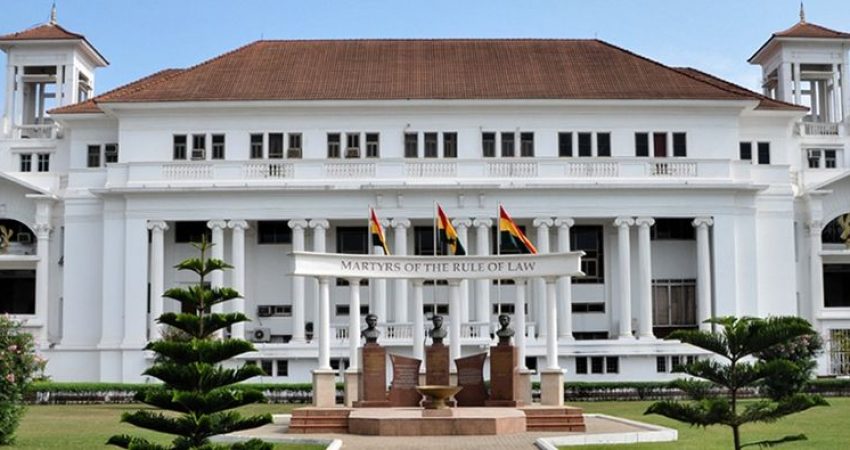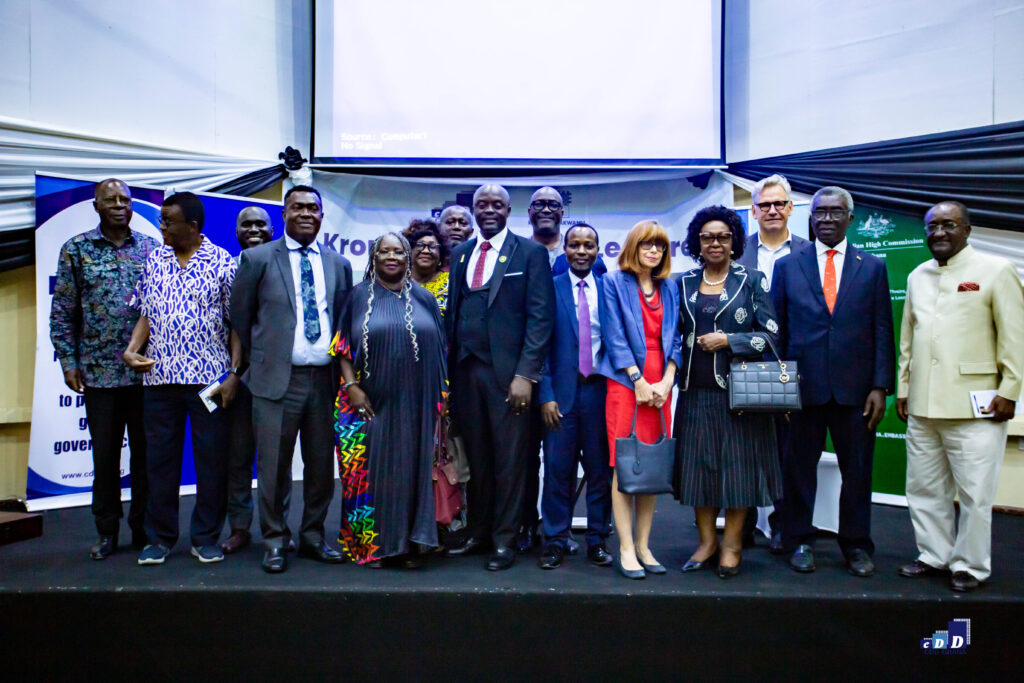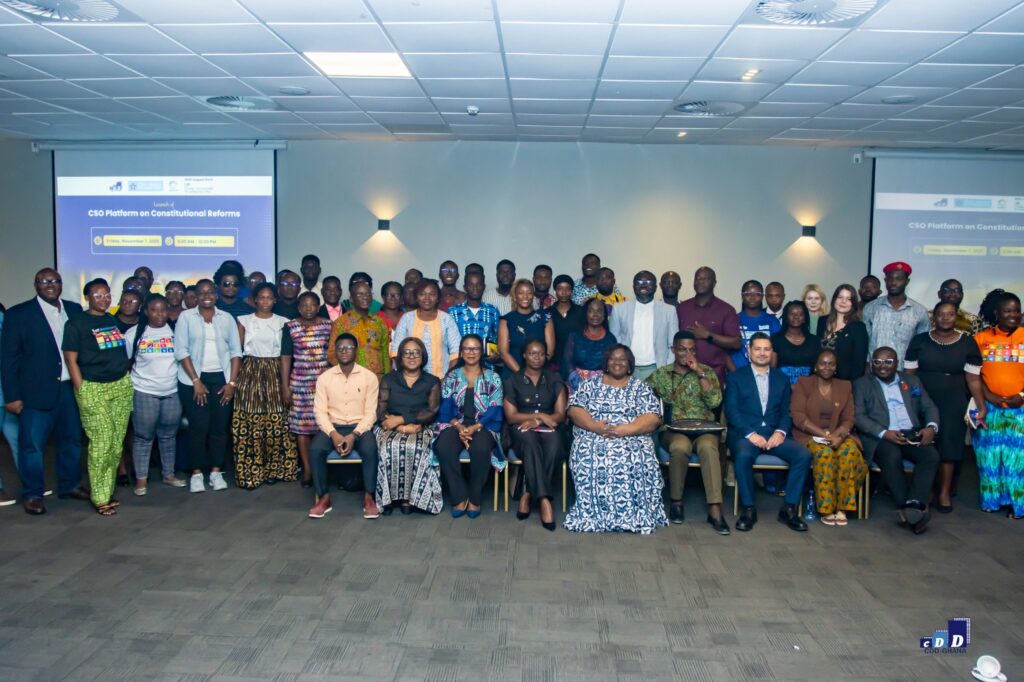By Elikem Gadzekpo
On December 18, 2024 the Supreme Court unanimously dismissed two lawsuits challenging the constitutionality of the Human Sexual Rights and Family Values Bill, 2024 also known as the Anti-LGBTQ+ Bill. The plaintiffs, a broadcast journalist and lawyer Richard Dela Sky and Dr. Amada Odoi, a lecturer at University of Cape Coast, brought the claim that the Bill violated Article 108 of the 1992 Constitution, which restricts Parliament from proceeding on bills that impose financial obligations on the state unless introduced by the President or a member of the Executive. The Supreme Court’s dismissal of the challenges against the Anti-LGBTQ Bill marks a pivotal moment in Ghana’s legislative history and sets an important precedent for private members’ bills.
What is a Private Members Bill (PMB)?
To understand the significance of the judgment, it is important to understand the term Private Members Bill. Originally adopted in 2020 by Parliament, the Private Member’s Bill allows for draft laws to be introduced in Parliament by a Member of Parliament (MP) who is not acting on behalf of the executive or the government. Although the provisions of the 1992 Ghanaian Constitution do not explicitly confer executorial powers on MPs to introduce bills in Parliament, constitutional experts have argued that implicit provisions within the Constitution, such as Articles 93(2), 108,22(2), and 185(3) confer such powers. This was welcomed relief as MPs for the better part of the country’s Fourth Republic were unable to initiate any bills in Parliament. Since its passage, several Bills have successfully passed the House, including but not limited to the Road Traffic (Amendment) Bill 2020, the Criminal Offences (Amendment) Bill 2021, and the Office of the Special Prosecutor (Amendment) Bill, 2021[1]. Despite the passage of these bills, MPs continued to face challenges in drafting and mobilizing support for such bills due to the dominance of the executive branch in the legislative agenda. MPs seemed unable to get over the biggest hurdle that is Article 108. However all this changed with the introduction of the Promotion of Proper Human Sexual Rights and Ghanaian Family Values Bill, 2021 (now known as the Human Sexual Rights and Family Values Bill or the anti-gay bill) by eight members of the House. By its singular intended action, the Promotion of Proper Human Sexual Rights and Ghanaian Family Values Bill, 2021 could forever redefine and change the way Private Member’s Bill could be utilized in Ghana.
The Capacity to Impose a Charge or Not
At the crux of the recent ruling by the Supreme Court on the Human Sexual Rights and Family Values Bill 2021 (originally introduced as the Promotion of Proper Human Sexual Rights and Ghanaian Family Values Bill, 2021) is the controversial piece of ‘uninterpreted’ law known as Article 108. In its simplest context, Article 108 seems to imply that only the president or anyone acting on behalf of the president has the authority to introduce public bills that place a charge on the Consolidated Fund. Article 108 reads as:
Parliament shall not, unless the bill is introduced or the motion is introduced by, or on behalf of the President
(a)proceed upon a bill including an amendment to a bill, that, in the opinion of the person presiding, makes provision for any of the following
(i) the imposition of taxation or the alteration of taxation otherwise than by reduction; or
(ii) the imposition of a charge on the Consolidated Fund or other public funds of Ghana or the alteration of any such charge otherwise than by reduction; or
(iii) the payment, issue or withdrawal from the Consolidated Fund or other public funds of Ghana of any moneys not charged on the Consolidated Fund or any increase in the amount of that payment, issue or withdrawal; or
(iv) the composition or remission of any debt due to the Government of Ghana.
This law is not new to the 1992 Constitution and in fact was retained in earlier constitutions, such as the 1969 and 1979 constitutions[2]. In countries like the United Kingdom where Ghana inherited its common law system, Article 108 is linked to pieces of legislation termed “money bills”, as they have direct or indirect effect on the national purse through expenditure of public funds, national taxation or state loans. Although only the President can introduce a money bill due to its expected impact on state funds, it is the speaker (the person presiding over the bill), not the President, who has the final word on whether a bill is a money bill.
Since the inception of the 1992 Constitution, Article 108 has been interpreted by legal professionals, practitioners and state leaders as a restriction on Parliament’s power to legislate and pass any private member’s bills, without some influence from the President. In recent years this interpretation has become a contentious issue, and a number of private members’ bills have been stalled or in limbo as the President has implied that only him or a representative of the Executive can introduce bills into Parliament that would directly or indirectly affect the consolidated fund. For instance, the MP for Madina, Francis Xavier Sosu, introduced the Criminal Offences (Amendment) Bill, 2023, the Criminal Offences (Amendement) (no.2) Bill, 2023 and the Armed Forces (Amendment) Bill, 2023 to Parliament, which were subsequently passed but President Nana Akufo-Addo refused to assent because he argued that these bills would have an impact and/or financial implications for the consolidated fund and other public resources[3].
It is clear that this understanding of Article 108 has heavily encroached on the work of Parliament. Realistically most, if not all, bills will impose some financial cost on the state, whether through implementation, enforcement or prosecution.
How Did We Get Here?
On January 31, 2021 an LGBTQ advocacy resource center opened in Accra sparking a plethora of criticism and resentment from many Ghanaians, including religious and state authorities. They called for the closure of the center, where LGBTQ advocates and community members were arrested and prosecuted. This caused a chain of events, leading to the introduction of the Promotion of Proper Human Sexual Rights and Ghanaian Family Values Bill, 2021 by eight members of Parliament. On February 28, 2024, Parliament passed the Human Sexual Rights and Family Values Bill, 2024 (Anti-LGBTQ Bill).
The object of the Bill is to prohibit LGBTQ+ and related activities, propaganda of, advocacy for, or promotion of LGBTQ+ and related activities, provide for the protection of and support for children, persons who are victims or accused of LGBTQ+ activities and other persons and related matters.
Both Dr. Amandao Odoi and Richard Sky filed two separate cases with the Supreme Court challenging the constitutionality of the Anti-LGBTQ Bill. In Dr. Amanda Odoi v Speaker of Parliament and Another the plaintiff contended that the Anti-LGBTQ Bill lacks constitutional validity as the Speaker of Parliament erred in his opinion that the Bill imposed no charge on the consolidated fund by allowing it to continue through the lawmaking process in Parliament. Additionally, her claim was that the Bill in fact does impose a charge on the Consolidated fund as the state would have to spend money on the facilities, health care needs, and resources needed for the sustenance of the prisoners while serving their sentence. She sought for the private members Bill to be struck as null and void.
Similar relief was sought in Richard Sky v Speaker of Parliament and Another, except the plaintiff in this case, also claimed that the bill violated the bundle of rights under Chapter 5 of the 1992 Constitution and that Parliament failed to satisfy the prescribed quorum as mandated by Article 104(1) of the Constitution.
The Supreme Court dismissed both suits on the grounds that the bill had not yet been enacted into law, rendering the challenges premature. Justice Avril Lovelace Johnson, presiding over the case, stated that “a bill cannot be subjected to constitutional review until it has received presidential assent, making it a valid enactment under Ghana’s laws”[4].
One of the key rulings, the Court fell on, was the ripeness doctrine, whereby the court is limited to adjudicate on the case due to the Bill’s stage as an enactment and not an Act of Parliament. The timing of any judicial intervention on the Anti-LGBTQ Bill was considered premature and the Court felt it was too early to make any decisions or determinations. The Court also found that both plaintiff’s claims lacked merit, particularly concerning the alleged violation of Article 108. Since the Bill had not yet been enacted, any potential constitutional issues were deemed speculative and not ripe for judicial review. Any challenges to the constitutionality of legislative procedures must be brought at the appropriate time, namely, after a bill has been enacted into law.
The Court also emphasized the principle of separation of powers found within the 1992 Constitution, underscoring that the judiciary should not interfere with the legislative process before a bill becomes law. Under Article 93(2) of the Constitution, legislative power is vested in Parliament. Article 58(1) provides that the executive authority shall be vested in the President and Article 125(3) provides that the judicial power shall be vested in the judiciary. The Court instructed that when there is a flaw in the process of law making which may result in the invalidity of or unconstitutionality of the law, the appropriate time to intervene would be after the completion of the legislative process. This is meant to protect the constitutional principle of separation of powers outlined in the 1992 Constitution. The court held that since the President had not assented to the law passed by Parliament, the legislative process was still incomplete, therefore it would refrain from determining its validity.
Even though the case was unanimously dismissed on the grounds that it was not yet law, two Justices of the Supreme Court gave concurring opinions on the interpretation of Article 108. Justice Asiedu indicated that Article 108 is concerned with whether the bill directly makes provisions for the prohibited matters, not the incidental costs of implementation. If the Court were to consider implementation costs, private members’ bills would effectively be barred from introducing any bills, as most laws involve some public expenditure. For a private members bill to pass its compliance with article 108, the person presiding must consider the following questions:
- Does the bill impose a tax or increase an existing tax?
- Does the bill impose a charge on the Consolidated Fund or other public funds?
- Does the bill authorize the withdrawal of funds from the Consolidated Fund or other public funds?
- Does the bill forgive a debt owed to the Government of Ghana?
If the answer to any of these questions is yes, the Speaker must direct Parliament not to proceed with the bill. If the answer to all questions is no, the bill may proceed to the next legislative stage.
Justice Ackah-Yensu, who took the route of a literal interpretation of Article 108 as it was written, held that the article does not dictate that it is necessary for bills to be accompanied with a fiscal impact analysis or report. In his opinion, the general rule is that bills should be introduced by or on behalf of the President. Private members may introduce bills, provided they do not impose a financial burden on the Consolidated Fund or other public funds of the state. This is the exception, not the rule.
Ultimately, the determination of whether or not the bill or any private members bill imposes a charge on public funds is held in the opinion of the Speaker. Justice Asiedu was of the opinion that Article 108(a) does not prescribe the manner in which the Speaker must express their opinion. Most would prefer the opinion to be written down for reference and record keeping, however, the absence of one does not mean the Speaker failed in their constitutional duty and the allowance of the Bill to proceed in the lawmaking process indicates an opinion. Although the Court is vested with the power by the Constitution to enforce and interpret it, the principle of separation of powers must be respected. Essentially, the court is of the view that it cannot dictate how the Speaker should express their opinion or mandate specific procedural steps for Parliament. The role of the apex court is to ensure constitutional compliance, not micromanage the legislative process.
What does this mean for Private Members’ Bills in the future?
The Supreme Court’s decision in both cases has significant implications for private members’ bills within Ghana’s legislative framework. By interpreting Article 108 as applicable only to bills that impose financial obligations on public funds and asserting judicial restraint over bills still under legislative consideration, the judgment reshapes the dynamics of parliamentary democracy in Ghana.
One of the most notable outcomes of this judgment is the potential empowerment of Members of Parliament (MPs) to propose laws independently without undue interference from the Executive. Members of Parliament can continue to bring forth bills into Parliament and the consequence of Article 108 and the opinion of the person presiding cannot be challenged until it has been passed and assented into law. Additionally, the Court has removed any potential barrier that is often used by the President to curtail legislative independence by limiting the scope of Article 108. Members of Parliament are now in a better position to propose laws that address social justice issues they deem pertinent. It also allows them to be more proactive in their legislative mandate, and to prioritize public interests and needs over partisan or executive-driven agendas.
On the other hand, the judgement also poses risks for a potential legislative gridlock as MPs will have more freedom to propose private members’ bills. If not well coordinated or prioritized Parliament could be overwhelmed with competing legislative proposals from MPs and the President, causing delays and inefficiencies in the lawmaking process. Effectively hindering Parliament’s overall productivity.
The Court emphasized that such bills are permissible as long as they do not directly impose taxes, increase public expenditure, or withdraw funds from the Consolidated Fund or other public funds. The Court’s focus on whether a bill directly makes provisions for prohibited matters ensures that private members’ bills are not unduly restricted, nonetheless, it means that the incidental costs of implementing a private members bill are not considered. Policy implementation and enforcement takes financial resources.
The judgement also sets a worrying precedent where it is not required that the Speaker’s opinion on Article 108 does not need to be written down. This lack of transparency makes it difficult for the public, civil society and other stakeholders to verify whether the Speaker has properly discharged their constitutional duty, especially when the need arises to reference this opinion. This also places a heavy burden on Plaintiffs to prove that the Speaker failed to comply with Article 108(a). It will make it difficult to challenge the constitutionality of private members’ bills, even in cases where there may be legitimate concerns.
Another significant risk is the potential misuse of private members’ bills for partisan or self-serving purposes. It gives way for harmful policies and legislations that violate certain democratic principles. The process cannot be halted until it is complete. With the slow judicial process, repealing a law takes more time than both its passage and implementation. MPs may exploit their newfound legislative freedom to advance narrow political agendas or curry favor with influential interest groups. Such misuse could undermine public trust in Parliament and detract from its primary role as a forum for addressing national issues.
In short, by clarifying the application of Article 108, the Supreme Court has opened avenues for greater legislative participation by private members. It also takes away the President’s power to refuse assent on the basis that a potential bill could impose a charge on the consolidated fund. While it also empowers MP’s to be more active in their role, it also raises questions and concerns about the Speaker’s ability to be transparent, as well as other challenges if not carefully managed.
[1]Edmund Agyemang Boateng, ‘Party Influence threatens Private Member’s Bill in Ghana’s Parliament’, The Fourth Estate (10 October 2023)<https://thefourthestategh.com/2023/10/party-influence-threatens-private-members-bill-in-ghanas-parliament/>
[2] Stephen Kwaku Asare, ‘The Meaning of Article 108’ Modern Ghana (Accra, 27 December 2023)<https://www.modernghana.com/news/1282277/the-meaning-of-article.html> accessed 13 January 2025
[3]Ibid
[4] Richard Sky v Parliament of Ghana and Another [2024] GHASC 20 (17 July 2024) ; Dr. Amanda Odoi v The Speaker of Parliament and Another [2024] GHASC 20 (17 July 2024)
 Elikem Gadzekpo is a Legal and Policy Officer at the Ghana Center for Democratic Development (CDD-Ghana).
Elikem Gadzekpo is a Legal and Policy Officer at the Ghana Center for Democratic Development (CDD-Ghana).
















